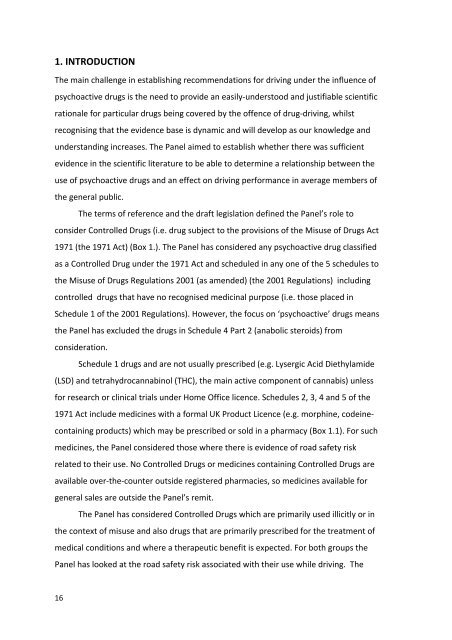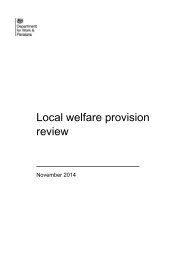drug-driving-expert-panel-report
drug-driving-expert-panel-report
drug-driving-expert-panel-report
Create successful ePaper yourself
Turn your PDF publications into a flip-book with our unique Google optimized e-Paper software.
1. INTRODUCTION<br />
The main challenge in establishing recommendations for <strong>driving</strong> under the influence of<br />
psychoactive <strong>drug</strong>s is the need to provide an easily‐understood and justifiable scientific<br />
rationale for particular <strong>drug</strong>s being covered by the offence of <strong>drug</strong>‐<strong>driving</strong>, whilst<br />
recognising that the evidence base is dynamic and will develop as our knowledge and<br />
understanding increases. The Panel aimed to establish whether there was sufficient<br />
evidence in the scientific literature to be able to determine a relationship between the<br />
use of psychoactive <strong>drug</strong>s and an effect on <strong>driving</strong> performance in average members of<br />
the general public.<br />
The terms of reference and the draft legislation defined the Panel’s role to<br />
consider Controlled Drugs (i.e. <strong>drug</strong> subject to the provisions of the Misuse of Drugs Act<br />
1971 (the 1971 Act) (Box 1.). The Panel has considered any psychoactive <strong>drug</strong> classified<br />
as a Controlled Drug under the 1971 Act and scheduled in any one of the 5 schedules to<br />
the Misuse of Drugs Regulations 2001 (as amended) (the 2001 Regulations) including<br />
controlled <strong>drug</strong>s that have no recognised medicinal purpose (i.e. those placed in<br />
Schedule 1 of the 2001 Regulations). However, the focus on ‘psychoactive’ <strong>drug</strong>s means<br />
the Panel has excluded the <strong>drug</strong>s in Schedule 4 Part 2 (anabolic steroids) from<br />
consideration.<br />
Schedule 1 <strong>drug</strong>s and are not usually prescribed (e.g. Lysergic Acid Diethylamide<br />
(LSD) and tetrahydrocannabinol (THC), the main active component of cannabis) unless<br />
for research or clinical trials under Home Office licence. Schedules 2, 3, 4 and 5 of the<br />
1971 Act include medicines with a formal UK Product Licence (e.g. morphine, codeine‐<br />
containing products) which may be prescribed or sold in a pharmacy (Box 1.1). For such<br />
medicines, the Panel considered those where there is evidence of road safety risk<br />
related to their use. No Controlled Drugs or medicines containing Controlled Drugs are<br />
available over‐the‐counter outside registered pharmacies, so medicines available for<br />
general sales are outside the Panel’s remit.<br />
The Panel has considered Controlled Drugs which are primarily used illicitly or in<br />
the context of misuse and also <strong>drug</strong>s that are primarily prescribed for the treatment of<br />
medical conditions and where a therapeutic benefit is expected. For both groups the<br />
Panel has looked at the road safety risk associated with their use while <strong>driving</strong>. The<br />
16



